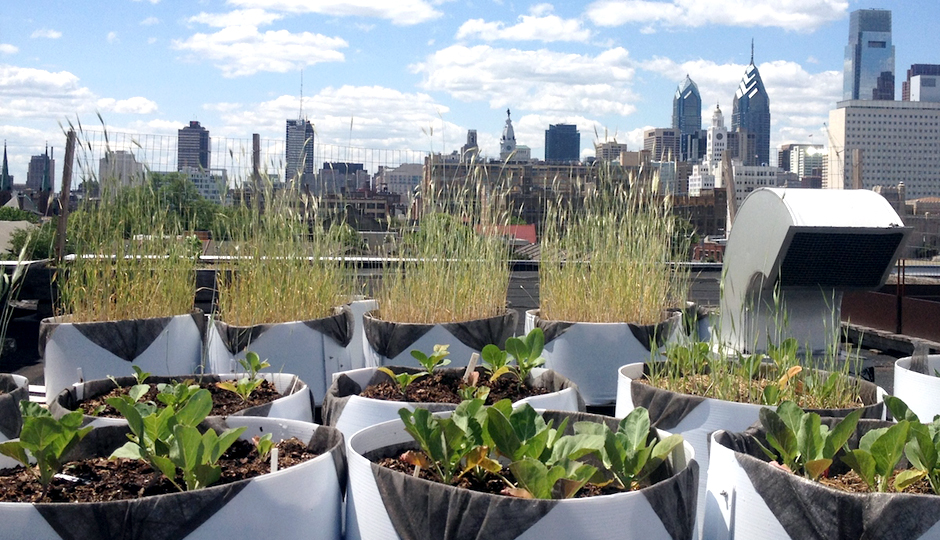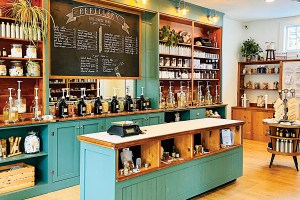Meet Cloud 9, the Philly Nonprofit Turning City Rooftops Into Urban Farms

Cloud 9 Rooftop Farm
Rania Campbell-Cobb was practically born a farmer — except, she wasn’t born on a farm. The 29-year-old West Philly resident actually grew up in suburban Maine, where her family had a robust backyard veggie garden. It was one of her favorite places to spend time with her hands in the dirt. “I grew up with food growing around me, and I was part of the process,” she says. “I understood that connection of where my food came from, and how it got from dirt to dinner table.”
In late high school, she began working on a family friend’s farm and continued to do so during summer breaks in college. So it wasn’t a surprise to anyone that after college, she found herself in New Zealand for five months, working on farms. “I got to see a lot of different ways that people were growing food and making it work financially, and supporting themselves, the community and the environment,” she says.
From New Zealand, Campbell-Cobb came to Philly, where she started working for Greener Partners as a farm educator. In 2012, she began Cloud 9, a nonprofit organization working to bring functional farms to rooftops across Philadelphia. Last year, she and her crew got the first one up and running, on the rooftop of Guild House West, a five-story apartment building for low-income seniors at 12th and Fairmount in the Poplar neighborhood. They grew herbs, peppers and greens and experimented with rooftop soils, irrigation techniques, and garden design.
Last month, they launched a fundraising campaign to raise $5,000 for a rooftop fence to make it safe for community members to get their hands dirty in the garden beds. Here, in her own words, is what Campbell-Cobb says she learned from the garden’s inaugural season, and how she hopes to grow Cloud 9 with more rooftop gardens dotting the Philadelphia skyline.
Be Well Philly: It seems like a no-brainer: Put unused rooftop space to work by turning it into a farm that can feed the community. Is it a tough sell?
Campbell-Cobb: Growing food on a roof is a weird thing, and it can be hard to convince people to do it. Green roofs have been taking off, but to grow food you need more soil depth so it takes more weight to put on the roof. Finding space that’s strong enough and building owners who are interested in experimenting is the key.
BWP: What kind of experimenting did you do last season, and what did you learn?
CC: We tried out three different soil media and found that a mix of compost, vermiculite and perlite — white specks in potting soil — and peat moss work well. That’s because together, they make a good drainage system, yet hold enough water, and the compost provides nutrition. We’re getting our compost from W.B. Saul High School. Herbs have worked really well and hot and sweet peppers, too. They have shallow root systems and can withstand hot, dry temperatures. We had some trouble with kale and collards because of the temperature extremes.
BWP: What do you do with the food you grow?
CC: We donate a portion to a food pantry run by residents in the building. We sell some at the Francisville Farmers’ Market at 19th and Fairmount. This year, we’re starting a partnership with Win Win Coffee Bar at 9th and Spring Garden, and we’re also going to start selling to other local eateries.
BWP: What makes an ideal roof for a rooftop garden?
CC: Not having black tar is better because the tar can make the surface 50 degrees hotter. Having easy access is really important — stairs or an elevator. It’s hard to carry planters up a ladder. Having some kind of water access, even if it’s not a spigot on the roof but a place to collect rain water or the ability to bring a hose up. We worked with Delaware Valley Rain Water Catchment Systems to put up two 55-gallon rain barrels. That takes care of most of our water needs. We have a hose running up from the ground level as a backup.
BWP: Does the garden provide a benefit to the building in any way?
CC: It provides additional insulation for the building, reducing heating and cooling costs. Because you’re putting something on top of your roofing membrane, it protects the roof from U.V. rays and deterioration, so it can double or triple the lifespan of your roof. And here in Philly, it can reduce your stormwater charges.
BWP: Why are urban farming and rooftop farming important to a city — specifically to a city like Philadelphia?
CC: They both address a lot of major social and environmental issues that cities are facing. They help with stormwater management and food access — you can grow food right where people are living and working. They creates outdoor spaces and activities where people can connect with their communities. I’ve found urban farming to be a great tool for building diverse community connections. I think our communities can get quite siloed, but I think there’s something about being outside and in the dirt that creates the opportunity for a community to come together. Of course, community buy-in is crucial. It’s been a little tricky cultivating that on the roof — people can’t just walk by and see what you’re doing when you’re five stories in the air — so we’ve had to get more creative in doing community outreach and fostering buy-in.
BWP: Creative, how?
CC: We host community events around town to share what we’re doing and get people excited for what it means for the community. On April 20th, we’re inviting local chefs to the rooftop for a potluck luncheon to talk about how rooftop farming can be useful for their restaurants.
BWP: Can anyone come onto the roof to learn about rooftop farming or, you know, just to hang out?
CC: Not yet — that’s why we need a fence. We’re raising money to buy this steel fencing system that meets OSHA regulations and building code requirements so we can have the public up on the roof. It’ll make it a safe space. It’s a system that doesn’t have to drill into the roof, so it’s a lot easier and safer to install. And I find it exciting because we’ll be able to use it as a trellis to grow vine plants. We want to have fun social and educational events for the community. We have an amazing view up there, and it’s really fun to be up on a roof surrounded by plants. You can see your community in an entirely different way.
Like what you’re reading? Stay in touch with Be Well Philly—here’s how:
- Like Be Well Philly on Facebook
- Follow Be Well Philly on Twitter
- Follow Be Well Philly on Pinterest
- Get the Be Well Philly Newsletter


